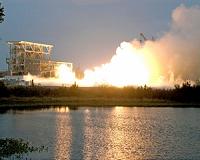 |
Washington DC (SPX) Feb 10, 2011 The Competitive Space Task Force, a coalition of fiscal conservatives and free-market leaders, has unveiled its strategy for creating a free and competitive market for spaceflight and space services enabling the country to recapture the imagination and innovation of America's space program and foster a new entrepreneurial spirit in the emerging Space Economy. The Task Force unveiled its core strategy and principles today at a press conference in the hearing room of the Committee on Science, Space, and Technology. Retired Congressman and former Chairman of the House Science Committee Robert S. Walker remarked, "The Space Economy is emerging as the next great frontier for economic expansion and U.S. leadership. If we really want to 'win the future,' we cannot abandon our commitment to space exploration and human spaceflight. The fastest path to space is not through Moscow, but through the American entrepreneur." In recent years, between the long-planned retirement of the Space Shuttle and the cancellation of Constellation and NASA's troubled Ares rocket program, the U.S. has grown increasingly reliant on the Russian Soyuz for transportation to and from the International Space Station costing taxpayers hundreds of millions of dollars over just the next few years. Rather than funding the Russian space program, the U.S. could be creating jobs at home by relying instead on America's private space industry. America's dependence on the Russian program is complicated by our foreign policy as we seek to discourage the Russians from aiding U.S. adversaries in the development of nuclear weaponry and missile technology. Said Rand Simberg, Chairman of the Competitive Space Task Force, "America cannot simply sit in the passenger seat and expect to lead. We need to pilot the ship. We need to lead the way." According to the Task Force, an open and free market for both space transportation and services would fuel innovation, lower costs and create jobs. Recommendations to Congress include: + Accelerating efforts to stimulate new American industrial competitive crew transportation systems to low Earth orbit; + Opening up the U.S. segment of the International Space Station to the fullest possible economic utilization by the U.S. private sector; + Utilizing fixed-price, pay-for-performance contracts to reward private investment and innovation in human exploration and spaceflight projects; + And dramatically reducing the costs of NASA programs while opening up new commercial opportunities for private business in space. The flawed assumption in the management of America's space program, according to Task Force leaders, is that centralized five and ten-year plans through cost-plus contracts to selected contractors is the most efficient way to innovate and compete with the global space community. While the Task Force acknowledges this approach worked for the Apollo program, they point to recent successes and innovation in commercial space transportation, increased international competition and the limitations on government funding as catalysts for a new decentralized and entrepreneurial approach. Said Simberg, "Government can and should create a framework for American industry and individuals to pursue their ideals and dreams, and space should be no exception. By opening space up to the American people and their enterprises, NASA can ignite an economic, technological, and innovation renaissance, and the United States will regain its rightful place as the world leader in space." Competitive Space Task Force ("CSTF") is a coalition of leading conservative and free-market thinkers from organizations committed to creating a free and competitive market for U.S. spaceflight and space services, reducing government waste at NASA, and reclaiming America's proud legacy of achievement in human spaceflight and technology innovation. Members of the Task Force include the Honorable Robert Walker; Competitive Enterprise Institute; Citizens Against Government Waste; TechFreedom; Andrew Langer, Institute for Liberty; Robert Poole, Reason Foundation; Ed Hudgins, The Atlas Society; and James Muncy, Space Frontier Foundation. Rand Simberg of the Competitive Enterprise Institute serves as Chairman of the Task Force.
Share This Article With Planet Earth
Related Links - Rocket Science News at Space-Travel.Com
 Rocket Team Hot Fire AJ26 Flight Engine For Taurus II
Rocket Team Hot Fire AJ26 Flight Engine For Taurus IISacramento CA (SPX) Feb 10, 2011 Aerojet, a GenCorp company, along with NASA and Orbital Sciences Corporation, conducted the acceptance hot-fire test of the second AJ26 flight engine that will power the first stage of Orbital's Taurus II medium-class launch vehicle. The test, conducted yesterday afternoon at NASA's Stennis Space Center in Mississippi, follows the successful acceptance tests conducted on Engine 1 in Novemb ... read more |
|
| The content herein, unless otherwise known to be public domain, are Copyright 1995-2010 - SpaceDaily. AFP and UPI Wire Stories are copyright Agence France-Presse and United Press International. ESA Portal Reports are copyright European Space Agency. All NASA sourced material is public domain. Additional copyrights may apply in whole or part to other bona fide parties. Advertising does not imply endorsement,agreement or approval of any opinions, statements or information provided by SpaceDaily on any Web page published or hosted by SpaceDaily. Privacy Statement |